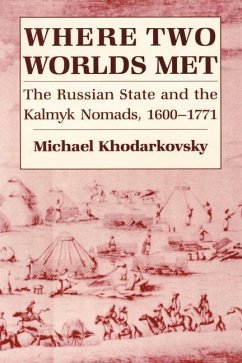During the seventeenth and eighteenth centuries the expanding Russian empire was embroiled in a dramatic confrontation with the nomadic people known as the Kalmyks who had moved westward from Inner Asia onto the vast Caspian and Volga steppes. Drawing on an unparalleled body of Russian and Turkish sources-including chronicles, epics, travelogues, and previously unstudied Ottoman archival materials-Michael Khodarkovsky offers a fresh interpretation of this long and destructive conflict, which ended with the unruly frontier becoming another province of the Russian empire.
Khodarkovsky first sketches a cultural anthropology of the Kalmyk tribes, focusing on the assumptions they brought to the interactions with one another and with the sedentary cultures they encountered. In light of this portrait of Kalmyk culture and internal politics, Khodarkovsky rereads from the Kalmyk point of view the Russian history of disputes between the two peoples. Whenever possible, he compares Ottoman accounts of these events with the Russian sources on which earlier interpretations have been based. Khodarkovsky's analysis deepens our understanding of the history of Russian expansion and establishes a new paradigm for future study of the interaction between the Russians and the non-Russian peoples of Central Asia and Transcaucasia.
Khodarkovsky first sketches a cultural anthropology of the Kalmyk tribes, focusing on the assumptions they brought to the interactions with one another and with the sedentary cultures they encountered. In light of this portrait of Kalmyk culture and internal politics, Khodarkovsky rereads from the Kalmyk point of view the Russian history of disputes between the two peoples. Whenever possible, he compares Ottoman accounts of these events with the Russian sources on which earlier interpretations have been based. Khodarkovsky's analysis deepens our understanding of the history of Russian expansion and establishes a new paradigm for future study of the interaction between the Russians and the non-Russian peoples of Central Asia and Transcaucasia.
Dieser Download kann aus rechtlichen Gründen nur mit Rechnungsadresse in A, D ausgeliefert werden.









